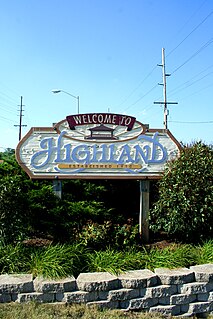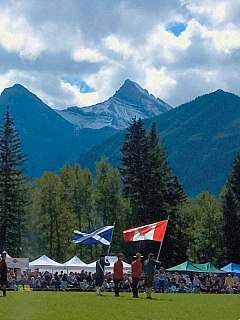
Highland is a town in Lake County, Indiana, United States. The population was 23,727 at the 2010 census. The town was incorporated on April 4, 1910. It is a part of the Chicago metropolitan area and North Township, and is surrounded by Hammond to the north, Munster to the west, Schererville to the south and Griffith to the east.

Highland Park is a city in Wayne County in the State of Michigan, within Metro Detroit. The population was 11,776 at the 2010 census. The city is completely surrounded by Detroit except for a small portion that touches the city of Hamtramck, which is also surrounded by Detroit.
Calder is a Scottish name and may refer to:

Highland cattle are a Scottish cattle breed. They have long horns and long, wavy, woolly coats that are coloured black, brown, yellow, white, grey, "silver", or tan, and they also may be brindled. Highlands are raised primarily for their meat. They originated in the Highlands and Outer Hebrides islands of Scotland and were first mentioned in the 6th century AD. The first herd book described two distinct types of Highland cattle but, due to crossbreeding between the two, only one type now exists and is registered. They have since been exported worldwide.

A Scottish clan is a kinship group among the Scottish people. Clans give a sense of shared identity and descent to members, and in modern times have an official structure recognised by the Court of the Lord Lyon, which regulates Scottish heraldry and coats of arms. Most clans have their own tartan patterns, usually dating from the 19th century, which members may incorporate into kilts or other clothing.

Tartan is a pattern consisting of criss-crossed horizontal and vertical bands in multiple colours. Tartans originated in woven wool, but now they are made in many other materials. Tartan is particularly associated with Scotland. Scottish kilts almost always have tartan patterns.

The West Highland White Terrier, commonly known as the Westie, is a breed of dog from Scotland with a distinctive white harsh coat with a somewhat soft white undercoat. It is a medium-sized terrier, although with longer legs than other Scottish breeds of terrier. It has a white double coat of fur which fills out the dog's face, giving it a rounded appearance.

Clan MacLeod is a Highland Scottish clan associated with the Isle of Skye. There are two main branches of the clan: the MacLeods of Harris and Dunvegan, whose chief is MacLeod of MacLeod, are known in Gaelic as Sìol Tormoid ; the Clan MacLeod of Lewis and Raasay, whose chief is Macleod of The Lewes, are known in Gaelic as Sìol Torcaill. Both branches claim descent from Leòd, who lived in the 13th century.
Ross or ROSS may refer to:

Highland games are events held in spring and summer in Scotland, United Kingdom and other countries as a way of celebrating Scottish and Celtic culture, especially that of the Scottish Highlands. Certain aspects of the games are so well known as to have become emblematic of Scotland, such as the bagpipes, the kilt, and the heavy events, especially the caber toss. While centred on competitions in piping and drumming, dancing, and Scottish heavy athletics, the games also include entertainment and exhibits related to other aspects of Scottish and Gaelic culture.
Livingstone is a surname and given name. The surname is toponymic. It is one of the habitual surnames eventually adopted by members of the Scottish branch of the Irish Dunleavy /MacNulty royals, including the ancestors of the African missionary doctor and African explorer David Livingstone. There may be a relationship between the Livingstones and Clan MacLea.

Clan Nicolson is a Lowland Scottish clan. The clan claims descent from an Edinburgh lawyer who lived in the 16th century and from a distinguished line of Aberdeen merchants who preceded him. During the mid-1980s David Nicolson, 4th Baron Carnock was recognised by the Lord Lyon King of Arms as the chief of Clan Nicolson. Around the same time, a Nicolson who claimed descent from the Highland clan of "Nicolsons" historically centred on Skye, petitioned the Lord Lyon King of Arms to be recognised as chief of his own clan. The Lord Lyon King of Arms accepted this man's petition on the condition he took the surname MacNeacail. In consequence there are two Scottish clans with similar names—the lowland Clan Nicolson and the highland Clan MacNeacail.

Clan MacNeacail, sometimes known as Clan MacNicol, is a Scottish clan long associated with the Isle of Skye. Tradition states that, early in its history, the clan held the Isle of Lewis, as well as extensive territory on the north-western mainland. The earliest member of the clan on record is one 14th century John "mak Nakyl", who is recorded amongst Edward I of England's powerful West Highland supporters during the Wars of Scottish Independence. John Barbour's 1375 epic, The Brus, suggests that by 1316, the clan had switched allegiance to Robert I, and made a decisive intervention in the new theatre of Anglo-Scottish conflict in Ireland. The marriage of an heiress to the MacLeods of Lewis brought a severe loss of lands and power in the following generation, forcing the clan chiefs to relocate to the surviving estates on Skye. However, the MacNeacails retained local significant influence: serving, according to tradition, as members of the Council of the Lords of the Isles and as custodians of the cathedral church of the Western Isles at Snizort. In the 17th century, members of the clan began to Anglicise their surname from the Scottish Gaelic MacNeacail to various forms, such as Nicolson. Today the English variants of the Gaelic surname are borne by members of the clan as well as members of unrelated Scottish families, including the Lowland Clan Nicolson.

The Clan MacLea is a Highland Scottish clan, which was traditionally located in the district of Lorn in Argyll, Scotland, and is seated on the Isle of Lismore. There is a tradition of some MacLeas Anglicising their names to Livingstone, thus the Clan Livingstone Society's website also refers to the clan as the Highland Livingstones. The current chief of Clan MacLea was recognised by Lord Lyon as the "Coarb of Saint Moluag" and the "Hereditable Keeper of the Great Staff of Saint Moluag."
Miller and Millar are surnames of English language, Old English or Scottish origin. There are two homonymous forms of Miller, one that began as an occupational surname for a miller and another that began as a toponymic surname for people from a locale in Glasgow. Miller of the occupational origin may also be translated from many cognate surnames from other European languages, such as Mueller, Müller, Mühler, Moller, Möller, Møller, Myller, and others. There is also a form in the early English lingusitics as Milleiir.

Clan Anderson is a Scottish clan that is recognized as such by the Lord Lyon King of Arms. However, as the clan does not currently have a chief recognized by the Court of the Lord Lyon, it is therefore considered an Armigerous clan. Variations of the surname are however considered septs of several other clans of the Scottish Highlands: The surname MacAndrews is considered a sept of the Clan Mackintosh and Clan Chattan, and also associated with the Clan MacDonell of Glengarry. The surnames Andrew and Andrews are considered septs of the Clan Ross.

Highland Park is an affluent suburban city in Lake County, Illinois, United States, about 25 miles (40 km) north of downtown Chicago. As of the 2016 population estimate, the population was 29,641. Highland Park is one of several municipalities located on the North Shore of the Chicago metropolitan area.

The Shire of Inverness is a historic county and lieutenancy area of Scotland. Covering much of the Highlands, it is Scotland's largest county, though one of the smallest in population, with 67,733 people or 1.34% of the national population.
Sean is a male given name of Irish origin. Its correct Irish spelling is Seán or Séan, while an older form is Seaghán or Seaġán. It is the Irish spelling of the Biblical name John. The Norman French Jehan is another version. Seán is the source for Anglo Gaelic versions such as Shaun, Shawn and Shon. Séan reflects the Ulster pronunciation and is anglicized Shane, Shaine or Shayne.













